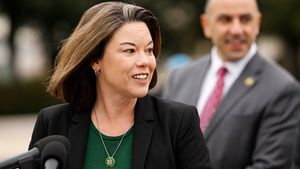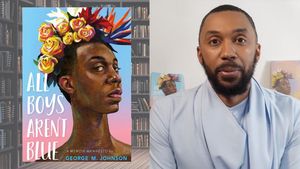On December 4, Chase Strangio will step into the U.S. Supreme Court to argue a case that could fundamentally reshape the future of transgender rights in America. It’s a historic moment, not just because of the stakes of U.S. v. Skrmetti, but because Strangio, a transgender man and legal trailblazer, will be standing before the highest court in the land, fighting for the rights of trans youth and their families.
Keep up with the latest in LGBTQ+ news and politics. Sign up for The Advocate's email newsletter.
“This will be my first time arguing before the Supreme Court,” Strangio tells The Advocate with characteristic humility, even though his name is already synonymous with many landmark legal battles for LGBTQ+ rights. As the co-director for transgender justice at the American Civil Liberties Union’s LGBTQ & HIV Rights Project, he has been at the forefront of some of the most significant cases affecting LGBTQ+ lives, including the fight against North Carolina’s “bathroom bill,” the challenge to the Trump administration’s trans military ban, and the Aimee Stephens case, which helped establish federal workplace protections for transgender people.
 SAUL LOEB/AFP via Getty Images
SAUL LOEB/AFP via Getty Images
But U.S. v. Skrmetti is different. The case challenges Tennessee’s Senate Bill 1, a ban on gender-affirming medical care for minors—a law that, if upheld, could have far-reaching implications for transgender rights, medical autonomy, and parental rights nationwide. For Strangio, the fight is as personal as it is professional.
A personal battle for families
The stakes, says Strangio, 42, aren’t abstract. He will be the first out transgender person to argue before the high court. “We’re living in a moment where legal barriers to people getting what they need have transformed in ways that have uprooted people’s lives,” he says. “We’re now in a situation where half the country bans this evidence-based medical care for transgender adolescents, overriding the decisions of their doctors and their parents to provide this treatment.”
He adds, “We want people to understand that this doesn’t start or end with the government intrusion into the decision-making of trans families. This is part of a broader agenda to limit people’s abilities to access medical care, which they need to make decisions that are right for them.”
 Bonnie Biess/Getty Images for Lesbians Who Tech & Allies
Bonnie Biess/Getty Images for Lesbians Who Tech & Allies
What makes the law particularly alarming, Strangio points out, is the selective way it’s enforced. Hormone therapy, puberty blockers, and other medical treatments that are outlawed for trans kids are perfectly acceptable, under the law, for cisgender kids to use for the treatment of other conditions. Those who suffer gender dysphoria, however, can’t. “This law bans treatment only when it’s used in a gender-nonconforming way,” he says. “If a cisgender child needs hormones for certain medical reasons, they can get them. But a transgender child can’t. It’s the government saying, ‘We get to decide what’s right for your gender, and we’ll block access to care that helps you live in a way we don’t agree with.’”
For Strangio, that is at the heart of U.S. v. Skrmetti. It’s about whether the government can come between families, doctors, and adolescents who agree on a treatment plan and whether the government can decide what care is right based on a child’s gender identity.
 iStock/Getty Images Plus
iStock/Getty Images Plus
Strangio’s own journey to understanding his identity was a long one. Growing up in the 1980s and 1990s, he says, there was very little representation of transgender lives. “There was nothing that I had access to that helped me understand transness,” he recalls. “It was an experience of self-loathing and alienation because I was in perpetual search for things I couldn’t find.” It wasn’t until his twenties that Strangio began to truly understand and embrace who he was. “My 20s were when I started to realize who I was and had access to understanding that. I became incredibly happy and healthy as a result,” he says. “Since then, I’ve wanted to spend my life making it easier for other people to access that same happiness.”
As a trans man and a parent, Strangio knows firsthand the lifesaving importance of gender-affirming care. He’s benefited from the treatments now being restricted across the country. “I wouldn’t be here today doing this work if it weren’t for the very health care that is now being demonized,” he says. Gender-affirming care is medically necessary and supported by major medical associations, including the American Medical Association and the American Academy of Pediatrics.
 Rob Kim/Getty Images
Rob Kim/Getty Images
Being a parent also connects Strangio to the families he’s fighting for. “When your child is in pain, you are in pain. If your child doesn’t have access to medication, you are incapacitated by that,” he says. “I think the thing I connect to most in this case is the idea that as a parent, you could lose the ability to protect your child.” It’s that shared fear and anguish that Strangio believes can transcend political lines. “Whether you’re a parent or a family member, when someone you love is hurting, you want to do anything you can to help them.”
Combating misinformation
As Strangio prepares for his Supreme Court argument, he knows he’s fighting not only in the courtroom but also in the court of public opinion, where misinformation about transgender people and their health care is rampant. The public narrative surrounding trans rights, particularly gender-affirming care, is riddled with falsehoods—something he’s keenly aware of. For example, President-elect Donald Trump has repeatedly uttered the falsehood that kids are going to school one gender and returning home another, having received surgical care in school.
“The idea that young people are consenting to treatment by themselves or getting surgeries at school—that’s completely farcical,” he says. But these harmful myths aren’t just noise—they’ve been weaponized to justify legislative attacks across the country. Strangio points to the over 500 anti-LGBTQ bills tracked by the ACLU, many of them targeting transgender rights, including bans on medical care for trans youth.
 Hyoung Chang/The Denver Post
Hyoung Chang/The Denver Post
Strangio explains that this kind of disinformation plays a crucial role in the political landscape. “The public conversation is absolutely legitimizing and fueling the range of attacks on trans people,” he says. The more people hear these lies, he says, the more they become skeptical of who trans people are and what we need to live.A recent Ground Media study found that anti-LGBTQ+ ads, while having a negligible effect on voting behavior, have eroded some of the gains in public opinion regarding transgender rights.
One of the criticisms Strangio says is often levied against gender-affirming care is the claim that there isn’t enough long-term research to prove its efficacy. Strangio calls this out as a double standard. “That’s true of all of medicine,” he says. “If that were the metric by which we measured any intervention for minors, we would be very critical of much of pediatric health care.” He says that the focus on transgender health care is outsized, noting that while trans people represent a small percentage of the population, they are subjected to disproportionate scrutiny and skepticism. According to the Williams Institute at the University of California, Los Angeles, School of Law, 1.6 million transgender people live in the United States. That’s 0.6 percent of the U.S. population.
Relating the issue to a broader audience
Strangio is also deeply committed to helping people outside the transgender community understand what’s at stake. He recognizes that many Americans might see transgender issues as far removed from their own lives, but he’s determined to bridge that gap. “At the end of the day, the people at the center of this case—the parents, the adolescents, and the doctors—are people who took none of these decisions lightly, who struggled, like all parents do,” he says. “There is nothing easy about parenting. And there is nothing easy about having your heart outside your body because you love your child more than anything in the world.”
Navigating a hostile political climate
Strangio’s fight for transgender rights is happening against the backdrop of an increasingly hostile political climate, which he describes as both alarming and exhausting.
The rise in anti-trans rhetoric, particularly from politicians and media outlets, has created an environment where trans people are constantly under siege. “What we’re seeing in the lawmaking at the state level from 2020 to 2024 is the consequence of that escalating rhetoric,” Strangio says. “The question is, what will be the next stage of that consequence? I expect it will be continued material harm to trans people based on a legitimized notion that you could debate whether our health care is legitimate, whether there are too many of us, and whether we should be excluded from bathrooms and sports. That is going to have so many ricocheting material consequences. We’re just beginning to scratch the surface with what we see now.”
 Rena Schild/Shutterstock
Rena Schild/Shutterstock
Despite the hostile climate, Strangio remains undeterred. “No amount of vitriol or hate is going to derail me from our work,” he says.
A lifelong advocate
Strangio’s career has been one defined by relentless advocacy. He’s been at the helm of cases that have shaped the legal landscape for LGBTQ+ rights, often making history along the way. But despite the accolades—including being named one of the top 40 LGBTQ lawyers under 40 in 2018 by the National LGBT Bar Association—Strangio credits those who came before him for laying the groundwork, particularly transgender people of color. “Without people like Pauli Murray, there would be no Brown v. Board of Education, no United States v. Virginia, and frankly no Bostock v. Clayton County,” he says, adding that Miss Major, Marsha P. Johnson, and Beverly Glenn-Copeland are among the giants upon whose shoulders he stands.
“They have just lifted me in my spirit for everything that I do, and those are the people I’ll be carrying with me into the courtroom alongside my clients and community who will be physically there,” he says.
He doesn’t take that responsibility lightly but doesn’t see himself as the story’s focus when history books are written. “I believe in community-based work. I don’t think about what this means for me individually,” he says. “What I care about is how we can change the trajectory of history so that it’s marching toward a more loving, celebratory place for trans people.”
Finding joy in the fight
Even amid the weight of his work, Strangio knows the importance of finding joy and creating space for his well-being. For him, living in New York City, that means being with fellow queer and trans people and immersing himself in the arts. “I love being around queer art and celebrating the brilliance of our community. It brings me so much joy,” he says, adding that he’s a big fan of theater and, yes, reality TV. “When I’m not working, I’m laughing with my brother, playing games with my kid, and just enjoying life.”
 Bonnie Biess/Getty Images for Lesbians Who Tech & Allies
Bonnie Biess/Getty Images for Lesbians Who Tech & Allies
Strangio says a deep love for his community is at the heart of it all. “I love being trans, and I love being alive,” he says. “Every day, I fight to prove that transness is something to be celebrated, not eradicated.”
Looking ahead
As for the future, Strangio remains cautiously optimistic, though he acknowledges the enormity of the challenges ahead. “When we look back on this time, I hope people will see how misguided it was to try and control people’s bodies and health care,” he says. “But we also need to address the bigger issues—like climate change. If we don’t get it together, there won’t be a planet for us to have these fights on.”
 Rob Kim/Getty Images for The Webby Awards
Rob Kim/Getty Images for The Webby Awards
Still, Strangio holds onto hope for a future where trans people are not just fighting for survival but are thriving. “What I think about is how can we change the trajectory so that our history is marching towards a celebratory place and a loving place for trans people and our communities,” he says.




 SAUL LOEB/AFP via Getty Images
SAUL LOEB/AFP via Getty Images Bonnie Biess/Getty Images for Lesbians Who Tech & Allies
Bonnie Biess/Getty Images for Lesbians Who Tech & Allies iStock/Getty Images Plus
iStock/Getty Images Plus Rob Kim/Getty Images
Rob Kim/Getty Images Hyoung Chang/The Denver Post
Hyoung Chang/The Denver Post Rena Schild/Shutterstock
Rena Schild/Shutterstock Bonnie Biess/Getty Images for Lesbians Who Tech & Allies
Bonnie Biess/Getty Images for Lesbians Who Tech & Allies Rob Kim/Getty Images for The Webby Awards
Rob Kim/Getty Images for The Webby Awards
















































